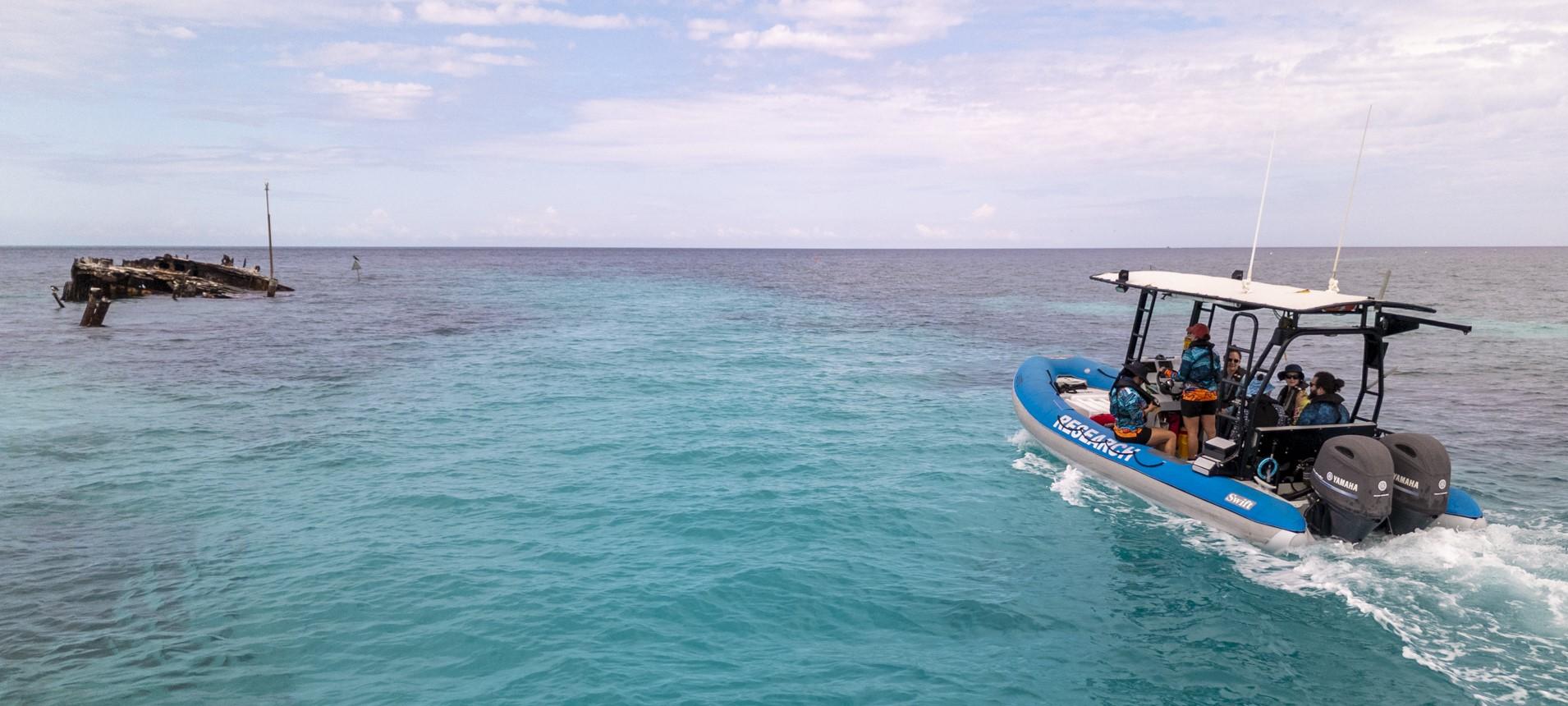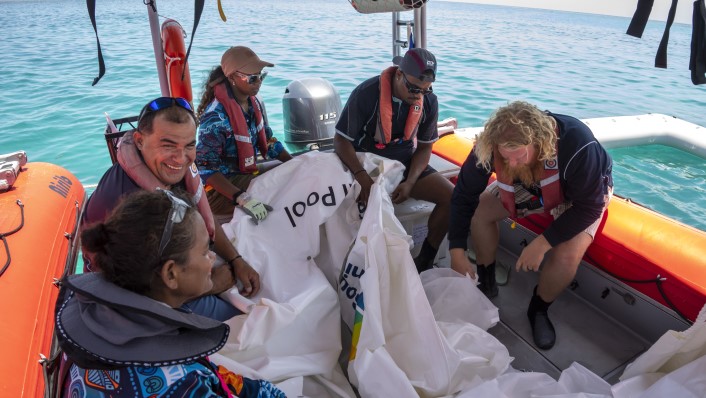Traditional Owners hold important cultural and spiritual connections to Country, including sea Country on the Great Barrier Reef. These connections power deep knowledge and care for the Reef, and inherent rights and responsibility for its future.
Reducing emissions is critical to ensuring the future of coral reefs around the world. However, good local management and interventions to restore reefs are also required. While the world works towards reducing emissions, AIMS’ continues to collaborate with scientists, engineers and Traditional Owners in Australia to develop a suite of approaches to fast-track reef recovery and resilience delivered at large scales.
At the heart of these approaches is harnessing the Great Barrier Reef’s own way to reproduce, replenish, heal and adapt - coral spawning.
But it is a huge challenge for science teams to apply the restoration tools they’ve developed across the large scales of the Great Barrier Reef.
To answer this challenge, we are building the foundations for their practical delivery across large areas of the Reef using people power.
The Indigenous Futures Project trains Indigenous Rangers in reef restoration. Led by AIMS, the Project uses science-backed techniques developed through the Reef Restoration and Adaptation Program (RRAP), and being tested at scale through the associated Pilot Deployments Program (PDP).
By building foundations today, Traditional Owners and other Reef community groups are informed, prepared, enabled and empowered to lead and participate in securing a future for the Reef.
Training Great Barrier Reef Indigenous Rangers on Woppaburra sea Country in 2025
In November 2025, Indigenous Rangers from eight Traditional Owner groups will gather on Woppaburra sea Country near Yeppoon on the Southern Great Barrier Reef to train in advanced reef restoration techniques, as part of the Indigenous Futures Project.
25 Rangers will be joined by around ten Indigenous researchers, scientists and support staff from AIMS’ Indigenous Partnership Program, making it AIMS’ largest Traditional Owner activity to date.
In this third year of the Indigenous Futures Program, Rangers are building on skills and knowledge learned during previous training, such as at the Whitsundays in 2023 and Heron Island in 2024 (see below), contributing to the largest restoration trial on the Reef to date - the Pilot Deployments Program.
The Rangers will be involved in all aspects of restoration activities such as deploying larval pools, collecting coral spawn slicks, monitoring coral larvae and young coral development, and deploying these onto the Reef in different ways. They will also be trained in tech-focussed methods of reef monitoring, such as ReefScan and ReefCloud.
2025 Sea Ranger Traditional Owner group participants
- Gidarjil Development Corporation
- Woppaburra Rangers
- Darumbal Rangers
- Yuku Baja Muliku Rangers
- Manbarra Rangers
- Gudjuda Rangers
- Yuwi Rangers
The Indigenous Futures Project
The AIMS-led Indigenous Futures Project works in partnership with Indigenous Ranger groups and the Reef Restoration and Adaptation Program. Its goal is to empower Traditional Owners to lead in caring for sea Country through reef restoration techniques developed to help reefs recover and build resilience to the effects of climate change.
This project provides a pilot group of Indigenous Rangers with advanced skills in reef interventions, enabled to lead these activities within their ranger groups for the future of sea Country when and where required.
This three-year project began in 2023 and includes formal accreditation units for participants in Certificate III in Conservation and Ecosystem Management. Through the development of accredited training resources, this project lays an important foundation to support future Traditional Owner-led intervention activities and contribute to large-scale efforts to help the future of the Reef. Training will continue through the PDP, and the skills learned will be used to help deliver reef restoration at scale.
This training opportunity is funded by the Traditional Owner Partnership component of the partnership between the Australian Government’s Reef Trust and the Great Barrier Reef Foundation.
Connections to sea Country
AIMS understands these connections and inherent responsibilities of Traditional Owner groups and seeks to build strong and productive relationships in marine science.
We do this by establishing genuine Indigenous science partnerships with Traditional Owners, and are guided by our Indigenous Partnerships Program.
AIMS acknowledges the inherent rights of Traditional Owners to be decision makers of what activities AIMS can and cannot do on sea Country through Free Prior and Informed Consent.
Learn more about AIMS' Indigenous Partnerships
Climate change and the Reef
Climate change is the greatest threat to reefs worldwide. Reducing emissions is critical to ensure the future of coral reefs, along with best practise management of local pressures and the development of restoration approaches to help reefs resist and recover from the effects of climate change.
Learn more about AIMS' research addressing the impacts of climate change
Core project team
Jordan Ivey – Project Lead, AIMS
Darin Gaw – Project Manager, AIMS
Toby Wright – Training and Field Support Officer, AIMS
Makeely Blandford – RRAP Indigenous Futures Field Technician
This training opportunity is supported by
The Australian Government through the Reef Trust Partnership with the Great Barrier Reef Foundation and the Pilot Deployments Program, through the Reef Trust
AIMS
Reef Restoration and Adaptation Program
with science, design and training assistance provided by:
- Teams within RRAP
- AIMS science teams
- Southern Cross University (SCU)
- Great Barrier Reef Traditional Owners
- Traditional Owner Advisory Group (TOAG)
- Crown-of-thorns starfish/Reef Restoration and Adaptation Science Traditional Owner Technical Working Group (COTS/RRAS TOTWG)
The larval rearing pools are used in collaboration with Prof. Peter Harrison (Southern Cross University) and Secore International.





